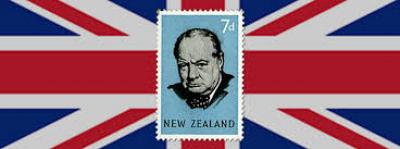Winston Churchill Cancelled in big chill-induced doctrinal diversions
The iron grip that United Nations has on the body politic became evident in the aftermath of the coldest day in New Zealand’s year during which there were widespread power failures, outages.
These were caused by power shortages. But attention instead was focussed on the IPCC report centred on global warming.
The government’s own broadcasting channel TV 1 sidelined both the coldest day and the ensuing power cuts to give a triumphant priority to the IPCC report on global warming.
In the ensuing debate in the nation’s parliament politicians of all stripe dodged the freeze and power cuts and competed among themselves in bestowing the most flowery speeches on the nation’s athletes who competed in the Japan Olympic s.
The United Nations doctrines so ardently and so unchallenged under the omnibus climatic banner were then capped by news that the nation’s Green Party had cancelled Winston Churchill. His portrait was unhooked from the parliamentary portrait gallery.
The United Nations syndrome in New Zealand and its success has much to do with applying a civil service bureaucratic theory to the effect that consistent failure and misguidedness is a more successful survival technique than a continuous display of efficiency which may frighten people.
This syndrome became evident when the Opposition National Party seeking to find a hole in the Labour-Green ruling parties turned on the individual most responsible for managing the nation’s evasion of all but a fringe contamination from Covid-19
Dr Ashley Bloomfield, the nation’s chief health official, was described as a showboater by the National Party Opposition leader after he became drawn into some United Nations-inspired boondoggling involving Oceania quarantine preference. The director general of health Ashley Bloomfield was described by the National Party’s Judith Collins as a “one trick pony.”
It was clinician Dr Bloomfield who masterminded the nation’s initial Covid cluster infection track and trace operations that deftly isolated the nation from any serious infection outbreak, an outbreak which internationally United Nations agencies should have intercepted
United Nations in New Zealand enjoys a sanctity and untouchability that was once conferred only upon the Vatican.
Advocates are well placed. Former prime minister Helen Clark who was unsuccessful in her campaign to become secretary general of United Nations is one. She is the mentor of the current prime minister Jacinda Ardern who is sometimes said to be a prospective candidate-in-waiting for the same job.
What also froze was the voices of the officials and the institutions in identifying the cause of the outage which was the unquestioned adherence to the United Nations climate warming doctrine.
Paralysed still are voices that might dwell on why, for example, China responsible for more emissions than the entire OECD put together is not bound by the United Nations doctrine even though it was a founder of United Nations
Instead, there is murmuring about it being a “developing” nation, albeit one that Western defence strategists point out is a nation that could emerge victorious in any conflict with some of its fellow UN members such as the United States, and indeed the whole of NATO.
To what extent did the United Nations hysterical focus on climate divert and distract constituted governing authorities everywhere from the true evolving crisis/emergency, the pandemic?
United Nations like the old bureaucratic monolith it is knows the dangers of being seen to back down on anything. So it continues to pour out alarm on the climate and encourages its many acolytes in places like New Zealand to insist on giving climate priority over plague, the real crisis, the one it only discovered at the same time as everyone else.
United Nations failings started to become evident in its core business of peace keeping in places like Rwanda and the Balkans.
Its spectacular failure in being caught off guard by the pandemic has by a stroke of bureaucratic genius been turned into a triumph. Thus it convinces small countries such as New Zealand and its politicians that this blunder was in fact a godsend in that it will build a world less prone to the climate emergency/crisis/extinction.
Immediately after the coldest-day and concurrent power cuts, United Nations indoctrinated acolytes in New Zealand instantly and unknowingly delivered a slick cover up set-piece in turning UN bungling into brilliance.
The pandemic it was widely announced through channels available to the government, which is most of them, had delivered a signal advantage. It had reduced the nation’s “emissions.”
New Zealand’s emissions in UN climatic terms are said to be somewhere between 0.2 and 0.17 percent. A miniscule fraction in other words.
Here though is the centrepiece of United Nations slickness which is use of selective data. New Zealand, a sparsely populated country, is UN disciples declare a polluting threat on a per-head basis.
How did United Nations become the policy high altar for a country such as New Zealand? How did it become a shining city on a hill for so many in a position of power, causing them to suspend any critical judgment?
Why does it inspire such fear and trembling and general paralysis among those charged with holding bureaucracies to account and however gigantic they are?

